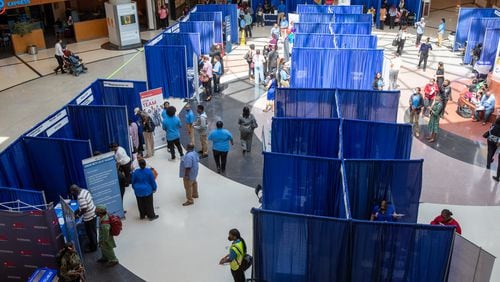Metro Atlanta added 8,800 jobs in May and also saw its unemployment rate rise slightly, but the uptick in the region’s historically low jobless rate may be more a function of seasonality than looming fears of economic storm clouds.
The state Department of Labor said the metro Atlanta jobless rate was 2.6% last month, up from 2.4% in April.
Rising unemployment often signals trouble, but last month’s slight increase may not be ominous. May is historically a time for job cuts as schools shut for the summer, some plants close for maintenance and many Atlanta consumers take their wallets to the beach or the mountains.
In fact, before the pandemic, metro Atlanta’s jobless rate rose in May in 27 of 30 previous years, federal data show.
Temporary hiring for summer jobs makes up for some of the losses, but many employers are having trouble finding workers for those seasonal jobs since so many full-time positions are available, Labor Commissioner Mark Butler said.
Moreover, unemployment is still near April’s record low.
Two years after the massive pandemic shutdowns, the metro Atlanta economy looks a lot like its pre-virus self: modest job growth along with a seasonal uptick in layoffs, according to a report Thursday from the state Department of Labor.
But there are differences.
The jobless rate is historically low and the number of job openings is vastly higher than the number of people searching for work. But there are fears of recession which could reverse all that.
Yet there is no sign yet of a chill in the metro Atlanta economy: The region has added 42,100 jobs since the start of the year. The 8,800 jobs added in May is far better than its historical pre-pandemic performance. Hiring was strong in a number of sectors, including hospitality, entertainment and recreation, positions that depend on consumer spending, Butler said.
The region hemorrhaged 390,400 jobs in the first two months of the pandemic, the unemployment rate soared into double digits and the Labor Department was overwhelmed with claims for jobless benefits. But since then, metro Atlanta has added 479,900 jobs and jobless claims have plunged to pre-pandemic levels.
Still, there is a spreading worry that the Federal Reserve’s campaign to tame inflation could undo much of those gains.
Prices of food, rent, gasoline and other items have been leaping at a pace unseen in four decades. To fight that, the Fed has been raising its benchmark interest rate, which translates to higher costs for borrowing as rates rise on credit cards, auto loans, bank lending and mortgages.
Wells Fargo economists recently wrote in a newsletter that “storm clouds are gathering around the broader U.S. economy,” predicting recession in the next 18 months.
“The ongoing carnage in the capital markets has real world implications for Peachtree Street, as it is now more costly and difficult for firms to raise capital,” Wells Fargo wrote. “We expect hiring to slow over the next few months.”
But companies that already have capital — and customer demand — are still expanding.
Okabashi Brands announced plans Thursday to invest $20 million in a renovation of its Buford factory, aiming to double shoe-making capacity. The company, a third-generation, family-owned company, will add 340 jobs during the next five years, officials said.
And even if there is a diminished need for workers in the short-term, it doesn’t have to mean significant job cuts in metro Atlanta, said Kurt Rankin, senior economist with PNC Financial Services.
While the Fed is doing what it always does to fight inflation, there is little precedent for the current moment, he said. “There is not a template. The Fed has never raised rates with the unemployment rate this low.”
Because there are so many job openings, companies can retreat from hiring plans without cutting staff, he said.
“We have a lot of cushion,” Rankin said. “We might see business pull forward the job losses (from the future) but not have real losses right now.”
Moreover, metro Atlanta is better positioned than most places to ride out the rate hikes, partly because it draws young people from around the country, said Jane Oates, president, Working Nation, a non-profit organization that studies the labor market.
More importantly, having a range of businesses, a wealth of research institutions and an array of demographics provides stability, she said.
“Atlanta is not a city that is tied to one thing,” Oates said. “And with people, it’s not just ethnic and racial diversity, there are well-educated, well-trained workers among each ethnic and racial group. If you are looking at diversity, you’ve got to look at Atlanta.”
More than 80% of small businesses are expecting a recession, according to a survey by Kabbage, which offers companies funding. More than 80% were also confident about surviving a downturn, Kabbage said.
Metro Atlanta job growth
May 2022: 8,800
Average May, pre-pandemic: 11,200
January to May, 2022: 42,100
Average January to May, pre-pandemic: -1,900
Metro Atlanta unemployment
Lowest, pre-pandemic: 2.6% (Dec. 2000)
Lowest, since pandemic: 2.4% (April 2022)
Recent: 2.6% (May 2022)
Job postings compared to pre-pandemic
Metro Atlanta: up 70.8%
Georgia: 66.9%
United States: 55.1%
Sources: Georgia Department of Labor, Bureau of Labor Statistics, Indeed
_____________________________________________
About the Author







